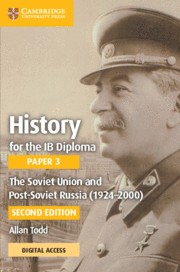|
Title information
Included components
Contents
The complete series
About the authors
|
Comprehensive books to support study of History for the IB Diploma Paper 3, revised for first assessment in 2017. This coursebook covers Paper 3, History of Europe, Topic 16: The Soviet Union and post-Soviet Russia (1924-2000) of the History for the IB Diploma syllabus for first assessment in 2017. Tailored to the Higher Level requirements of the IB syllabus and written by experienced IB History examiners and teachers, it offers authoritative and engaging guidance through the topic.

Print
The text delivered in print format.

Cambridge Elevate
Our Cambridge Elevate enhanced editions contain extra subject-specific digital content to engage your students, develop their understanding and accelerate their learning. With teachers and students in mind we carefully consider which concepts and learning objectives are hard to understand and would benefit from extra digital content.
Developing the intellectual, personal, emotional and social skills to live, learn and work in a rapidly globalising world. Cambridge University Press is a leading publisher for the IB Diploma, offering up-to-date resources that draw on an unparalleled level of expertise. Written by specialists for students and teachers of the IB Diploma Programme, our best-selling titles help to inspire, motivate and focus students to success in their education. ALL TITLES IN SERIES:
|
REGION:
Australia & New Zealand
LEVELS:
Year 11 / Year 12
SUBJECT AREA:
International Education / Business, Economics, and Legal / Humanities / Geography / History
ISBN:
9781009190053
PUBLICATION DATE:
13/01/2022
















































